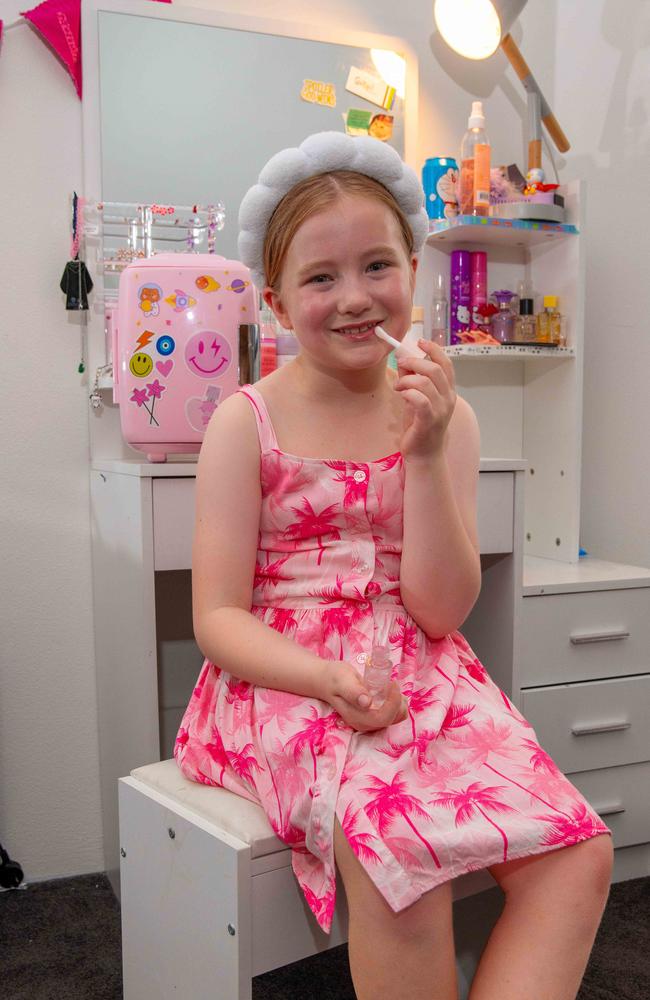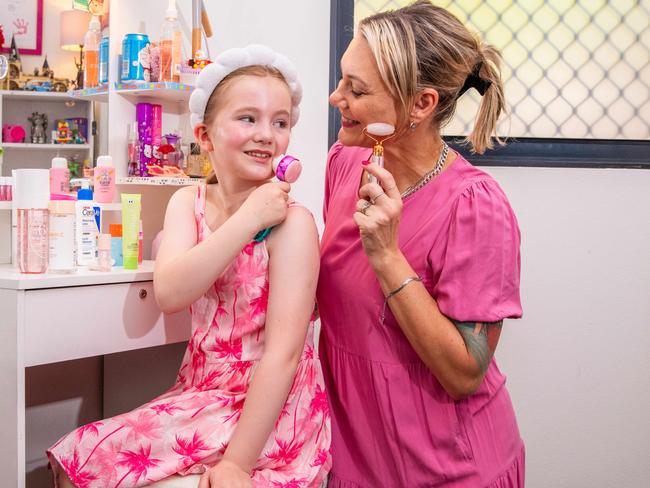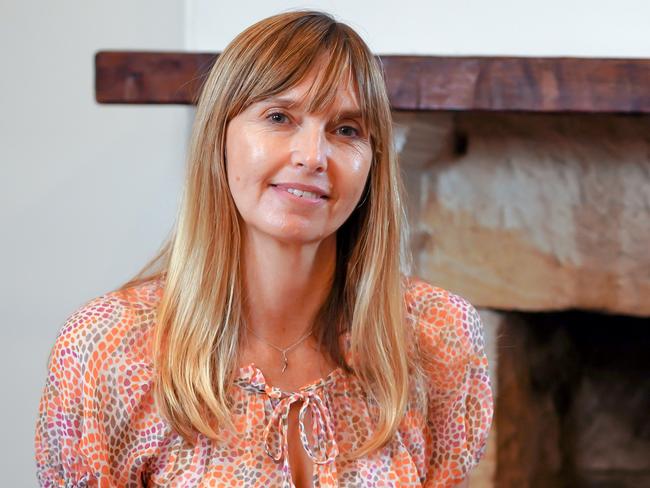How TikTok ‘skinfluencers’ are targeting Aussie kids in a dangerous skincare trend
“Skinfluencers” are having a huge impact on the lives of Aussie kids. See how one mum is fostering her child’s love of skincare while keeping her safe.
National
Don't miss out on the headlines from National. Followed categories will be added to My News.
Lola has a multi-step skincare routine which she religiously commits to twice a day.
She starts with a cleanser, then toner, serum, moisturiser and finishes with a hydrating face mist spray. She adds sunscreen as part of her morning ritual. She is nine years-old.
“When I first put on skincare it felt so nice,” Lola said.
“I saw it on social media and YouTube and stuff and so I just tried some of it on because my friends have it and so I decided I wanted to get some.”
She’s not the only tween obsessed with skincare. It’s a worldwide craze, worth billions of dollars.

Social media influencers – nicknamed skinfluencers – which include a long list of Aussie schoolgirls, often spruik products worth hundreds of dollars.
Such is the sway of social media, at the top of Lola’s Christmas list were items from Mecca, a beauty retailer, which bizarrely is now the go-to store for a whole cohort of Gen Alpha kids (those born since between 2010).
Brands such as Drunk Elephant, Glow and Sol de Janiero have gone viral thanks to the skincare trend, while one Bubble Slam Dunk Hydrating Moisturiser, worth $25, sells every 10 seconds globally.
Lola is not allowed on TikTok, but learnt about skincare routines from friends at school.
She watches the age appropriate platform YouTube Kids, but that is also flooded with Get Ready With Me (#GRWM) videos, where influencers go through their skin and make-up routines in front of the camera.
All of Lola’s friends own spa headbands to keep their hair off their faces while they do their routines, and mini skincare fridges, to keep their products cool.
They often video call each other from their bedrooms while they go through their skincare steps, like the influencers they see on social media.
One of the most popular skinfluencers are two seven-year-olds with millions followers.
They recently did a tongue-in-cheek video joking that being Gen Alpha influencers meant they are obsessed with skincare, their favourite stores are Sephora and Ulta and they don’t like to play with toys.
While the video sketch is a joke, that is now the shocking reality for many young girls.

Lola knows more than most about the dangers of using products not safe for young skin, her mum Jeanne Jenkins, 52, has made sure of that.
“We discussed it and she did lots of research because she wants my skin to be safe,” Lola said. “I am not allowed to use retinol or hyaluronic acid.”
Ms Jenkins said was initially alarmed by daughter’s interest in skincare, which started when she was eight. She has tried to carefully manage the situation.
She started researching some of the products her daughter wanted and pointed out to her that some were unsuitable and found cheaper, safer alternatives from Kmart or Priceline.
“Rather than saying this is something they shouldn’t get into, why not educate them and give them the information that they need,” Ms Jenkins said.
She also continues to reinforce to Lola that it is “better to be kind than to worry about how you look”.

Body image expert Helen Bird, from the Butterfly Foundation, which supports people with eating disorders, said it was important for parents not be judgmental about their children’s interests and not beat “our kids up for inevitably wanting to explore those”.
But she encouraged parents to help their children with their media literacy skills, and to understand that “making us feel bad sells” and that people are making millions from the fear of eight-year-olds worried about the ageing process.
“If an eight year old feels that their skin is already not good enough and that they need to be more youthful than they already are, or that they are fearful of the ageing process, it must be really, really difficult for parents.”
Lola’s mum said there are some positives from the skincare movement, her daughter insists on using sunscreen on her face every day and she has started to do it herself, at her daughter’s insistence.
“It’s a really big part of skincare,” Lola said. “You can get skin cancer. No one wants skin cancer.”
‘UNHEALTHY, DANGEROUS’ HASHTAGS PARENTS NEED TO KNOW
Parents are being warned to keep an eye on what hashtags their kids are following, with some trends promoting unhealthy and dangerous behaviour.
Body image experts say the hashtags and trends are constantly evolving, but parents should be tuned into what their kids are interested in online.
As well as limiting time on devices, they say they should discuss with their child, in a non-judgmental way, what they’re looking at and keep the lines of communication open.
#Get Ready With Me (GRWM) who would have thought getting ready for work or school could be so lucrative? Watching people do their skincare, makeup or hair in the morning is literally a money maker and drawing in millions of views a day. But some of these products being spruiked by influencers cost hundreds of dollars and may damage some people’s skins.
#girldinner it started as a fun hashtag with girls showing funny pictures of their dinners, but it turned into people posting plates with tiny amounts of food on it, again sparking concerns about eating disorders.
#cleangirleasthetic is all about creating a very natural look, but behind it all is hours of work, involving intricate skincare routines, makeup, nails and hair grooming. Body image experts warn this is another way to make girls feel they are ‘not good enough as they are’.
#thatgirl to achieve this hashtag status you have to wake up at 5am, do a work out, eat avo on toast and write in your journal before anyone else has even woken up. You look immaculate in activewear and you’re in control of your whole life. Psychologists say it is an impossible ideal.
#legginglegs as a hashtag on TikTok has been blocked. It involved people sharing their concerns that their legs didn’t look good in leggings. TikTok now redirects those searching that term to eating disorder support resources.
For support with eating disorders or body image concerns, call Butterfly’s National Helpline on 1800 ED HOPE (1800 33 4673), chat online or email support@butterfly.org.au.
Or go to the website: butterfly.org.au
More Coverage
Originally published as How TikTok ‘skinfluencers’ are targeting Aussie kids in a dangerous skincare trend





